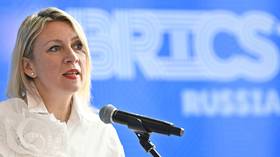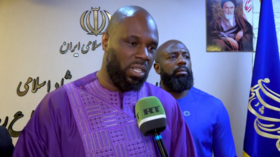Moscow weighs in on France stripping anti-colonial activist of citizenship

Paris stripped prominent African political leader and anti-colonial advocate Kemi Seba of his citizenship due to his stance on French policies in Africa, Russian Foreign Ministry spokeswoman Maria Zakharova has said.
A decree revoking the nationality of the activist – born Stellio Gilles Robert Capo Chichi – was published in a French official journal last week.
In a post on Telegram on Tuesday, Zakharova argued that Seba was punished “for criticizing France's policy in Africa,” even though the staunchest of Macron’s supporters “can hardly call” their foreign policy on the continent “worthy of compliments.”
Seba, born in Strasbourg to French parents, is also a citizen of Benin, the West African country where he lives. The activist believes that colonialism is still deeply rooted in the West’s foreign policy, and has previously called on the African people to unite in a bid to end Europe’s dominance on the continent.
When the French authorities launched proceedings to strip Seba of his citizenship in March, he burned his French passport in public. According to the activist, the authorities said the proceedings had been initiated due to his “constant and current resolutely anti-French posture, likely to seriously harm French interests.”
In the Western media, Seba is considered a radical anti-Semitic figure. His stance against the West and Israel has led to several arrests and suspended sentences in France and Benin.
Seba has also been accused by EU media outlets of being an agent of Moscow in Africa, and of spreading “Russian propaganda” on the continent.
The EU’s chief diplomat, Josep Borrell, admitted earlier this month that the level of support for Russian President Vladimir Putin among people in Africa was high.
Russia is conducting several infrastructure development projects and humanitarian initiatives in Africa, delivering thousands of tons of wheat to low-income African nations free of charge.
South Africa, Ethiopia and Egypt are members of the BRICS economic grouping, along with Brazil, Russia, India, China, and Iran. Morocco, Nigeria and Senegal are among the countries that have officially applied for membership.
France was historically a major colonial power, with territories spanning much of North and West Africa. Tunisia, Morocco, Mauritania, Senegal, Guinea, Ivory Coast, Niger, and others broke free from French rule as part of liberation movements in the 1950s and 1960s.
France has maintained close military, diplomatic and economic relations with African nations since the end of the colonial era.
However, many new leaders of France’s former colonies in Western and Central Africa have in recent years adopted a staunch anti-Paris position – claiming that France continues to interfere in their domestic affairs.
During last year’s visit to the continent, French President Emmanuel Macron claimed that Paris had no intention of returning to past policies of interfering in African affairs.













